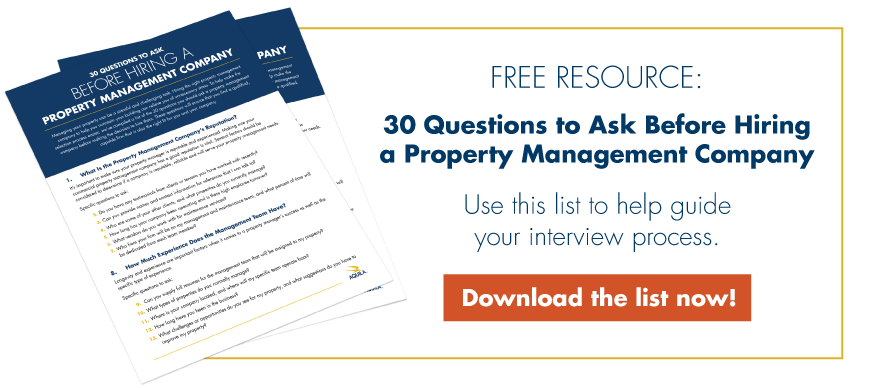Finding the right commercial property management company to manage your property can be challenging. Clients often ask us, “How can I choose the right property management company for my commercial property?” There are a number of vendors in the market, and it can be difficult to know which one will do the best job for you.
A good property manager will take all of the day-to-day operations of your property off of your plate and keep your building and your cash flow running like clockwork.
In order to help you select the right property manager for you, we’ve compiled this list of four things to consider when hiring a property manager for your office, industrial or retail property.
Read Next: Key Questions to Ask Before Hiring a Property Management Company
How to Choose the Right Commercial Property Management Company
1. Consider Working with the Same Firm That Handles Your Leasing
To choose the right commercial property management company, a good place to start is to check if your leasing company offers property management services. If they do, hiring the same company for property management can be incredibly beneficial and can lead to consistency and compatibility of services. This includes more seamless service for your tenants and streamlined lease negotiations. With these benefits and more, issues can be addressed quicker and smoother than if you have two separate teams.
In addition, the management team can offer your leasing team valuable insight into the daily status of the tenant.
Read Next: The Ultimate Guide to Hiring a Commercial Property Management Company
2. Ensure The Company Fits Your Property’s Needs
You should be sure the property management company you are considering has adequate and qualified staff to meet the size requirements of your asset. The size of the team that is necessary for your property will vary depending on the size of the asset. A team can consist of, but is not limited to, a senior property manager/property manager, assistant property manager(s), administrators, accountants, and building maintenance engineers.
Management duties can vary greatly, depending on the ownership structure – be it private or institutional – and the type of property – retail, office, or industrial. Be sure the management company has experience with your property or portfolio type and has the ability to execute your objectives and goals.
Generally, a property manager’s duties consist of the day-to-day management of the building operations, financial reporting and support, maintenance schedules, and tenant relations. They can also include emergency response including flooding, fire, chemical spills, and any other emergency or disaster that may arise. Management duties also include leading major capital updates to a property alongside a project manager.
To learn more about a property manager’s responsibilities, read our article What Does a Property Management Company Do?
And it’s not just about the building services. Be sure the management company you choose has the capability to adapt to the processes of your company in regard to financial reporting, day-to-day operational processes, and budgeting.
3. Make Sure the Management Company is Credentialed
There are various credentials that are prominent in the property management profession. It’s recommended that all management firms and managers have at least one of the following credentials in order to certify their expertise as a property manager.
Certified Property Manager (CPM®)
To achieve Certified Property Manager status, the applicant must have three years of experience prior to applying and have a real estate salesperson license. They are recognized as experts in real estate management. According to the National Association of Realtors, 70% of those who hold the CPM designation hold the highest management positions in their offices. This certification is administered by the Institute of Real Estate Management.
Real Property Administrator (RPA®)
The Real Property Administrator certification goes into detail on the operational side of the profession and is administered by the Building Owners and Managers Institute. All applicants must demonstrate three years of property management experience and complete various courses. This program teaches property managers how to maximize an asset’s income and minimize risk.
Accredited Management Organization (AMO®)
An Accredited Management Organization is a company certification that requires having an executive team member with a CPM. This is administered by the Institute of Real Estate Management. According to the IREM website, AMO Firms are led by knowledgeable executives who hold the CPM designation and are rigorously trained to maximize value, minimize risk, and partner with you to achieve your goals
Service Organization Control (SOC 1®)
A Service Organization Control proves that an external auditor has confirmed the security of the internal controls, meaning that client financial data is kept secure. This ensures that the property management company, as well as the owner, are protected and can make future audit requests run more smoothly.
Systems Maintenance Administrator (SMA®)
Systems Maintenance Administrator applicants must have three years of experience as a stationary engineer or equivalent at a property portfolio of at least 40,000 square feet. This program ensures the applicant can improve operations, create energy efficiencies, reduce costs and enhance the value of an asset. This is administered by the Building Owners and Managers Institute.
Generally, a more experienced and accredited team will be better able to address your needs. It’s important to consider the experience and expertise of building staff and engineers as well.

4. Consider the Local Presence and Reputation of the Property Management Company
What is the local presence of the company that you’re considering? The company should have an established local presence. A larger local presence often means they will have a better ability to address your property’s needs due to a large base of employees, connections, and resources. Not only will they be familiar with and have existing relationships with local vendors, but there are also economies of scale that can be secured by working with a firm that represents a number of properties in one market.
The property management company should have strong vendor relationships in your area. This will mean they are able to obtain all materials needed for routine maintenance as well as capital updates at competitive prices. This can help keep operating expenses from increasing drastically.
You should also consider the reputation of the entire team. While the quality of the managers you are working with matters, the work is only as good as the people doing it, so knowing the reputation of building staff and engineers is important.
Beyond vendor relations, it is equally as important that your property management company has a good reputation with its tenants and other building owners.
Conclusion
As you can see, there are many things to consider when choosing a property management company. While credentials and reputation are important, these are just a few considerations. Ultimately, you should choose based on your company’s needs and budget. Research the various local property management companies and compare their priorities and make sure they line up with your own.
A good property management company can make or break the owner/tenant experience. In general, their role in organizing finances, serving tenants, and maintaining the building adds more value to the property than the fee charged to hire a property management firm.











